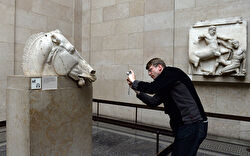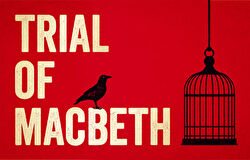
So that’s it, for another year. Eight clever young people return to their student lives to prepare for their exams in decent obscurity. After that will come nerve-racking applications for research funding, and the tedious business of making a living. Delighting millions with their lightly worn knowledge won’t count much then.
But they will sally forth carrying in their minds the memory of how for a while their grimaces, their haircuts, their wardrobe, and their behaviour under stress were made plain for millions. Like GK Chesterton’s “The Donkey” (though they are self-evidently not donkeys) in which “the devil’s walking parody/ On all four-footed things” recalls the time when “there was a shout about my ears,/ And palms before my feet”.
There is no prize money and little largesse beyond some cheap sparkling wine and Cheesy Wotsits after the recording.
The four students from the winning University Challenge team will carry the trophy back to their institution, where it will gather dust in the porter’s lodge or behind the Union bar until it is returned to the producers in a year’s time, to be presented to next year’s winners.
University Challenge was never intended as the mass audience show it has become. It began life in the second world war, when a charming Canadian devised a quiz game to entertain bored troops.
This year, social media transformed another Canadian, Eric Monkman, a graduate student at Wolfson College, Cambridge, who comes from a suburb of Toronto and looks as if he is still dressed by his mother, into a star. Women wanted to have his babies, men wanted to be him. Mr Monkman is a delightful, impeccably mannered young man whose bespectacled face was soon appearing on memes supplanting that of the strutting little Corsican in David’s painting of Napoleon crossing the Alps. Surely the most unexpected comment of the year was his reply to a British newspaper that he doesn’t consider himself “an object of desire”.
We had invited Stephen Hawking, a fan of the show, to present the trophy. “I can’t believe Stephen Hawking got to meet Eric Monkman,” said one tweet.
In the event, Mr Monkman’s Wolfson team were crushed by a rigorous performance from Balliol College, Oxford, who amply proved the justice of the old rhyme about their legendary Victorian Master, Benjamin Jowett: “Here come I, my name is Jowett./All there is to know I know it.”
“No one likes a clever-clogs,” they say in our dumbed-down age. It’s rubbish. We do like them. Television producers are forever dreaming up new formats, often with cash prizes attached, to prove you don’t need to be clever to be a winner. Their quizzes are almost always gimmicky, vulgar or stupid. The questions on University Challenge, by contrast, have deliberately been made more difficult. And the audience has risen. No one can prove cause and effect. But it does demonstrate that television is not forced to treat the audience as morons to persuade them to watch.
Distrust and detestation of those who claim to know what’s good for us is one of the striking characteristics of 21st-century political life, as shown by the Brexit vote and the election of Donald Trump. But here we luxuriate as what is unquestionably an elite show us what they’re made of. The British secondary education system has been trivialised and demeaned, for many complicated reasons. But University Challenge allows us to wonder at the fact that young people still care about getting things right and still know amazing things. We admire. We marvel. And we are also reassured: it is simply not true that modern youth is characterised by oafishness and aggression. The yahoos have not won.
Yet, regular as clockwork, the carping begins from middlebrow columnists. Why were this year’s finalists from Oxford and Cambridge? Why were they all men? The answers are really not hard to find. Plenty of other institutions have won the championship in the past: a team from Balliol, Oxford, were beaten by the University of Leicester in the first series broadcast and Manchester have won the title four times. The strong Oxbridge presence may have something to do with the fact that Oxford and Cambridge are two of the finest universities in the world.
As for the testicle issue, since we know that intelligence is not determined by gender, it must be a question of taste. The teams are not chosen by the college or university authorities but by the students themselves. The students are encouraged to enter teams which broadly reflect their institution. I suspect that — like football or darts — more males than females care about quizzing. A growing number of applicants “prefer not to be gendered”. But long experience has convinced me that the contest cannot be engineered at any stage. It is what it is: just a quiz requiring the demonstration of sometimes quite recondite knowledge. Its popularity with millions, from cabbies to cabinet ministers, lies in the fact that we can share the experience from our own armchairs. Most of us are going to fail most of the time. But, gosh it’s exciting, and comforting, that others do not.
When Prof Hawking appeared, the two teams of finalists were charming and, frankly, I felt, a little awestruck. Joey Goldman and his three Balliol teammates were reverential. Mr Monkman’s face creased in an ear-to ear smile at meeting his hero.
We have probably passed peak Monkmania. But there were dozens of other clever young people in this year’s series. We have begun work on the next, and, I can assure you, there are plenty to come.


